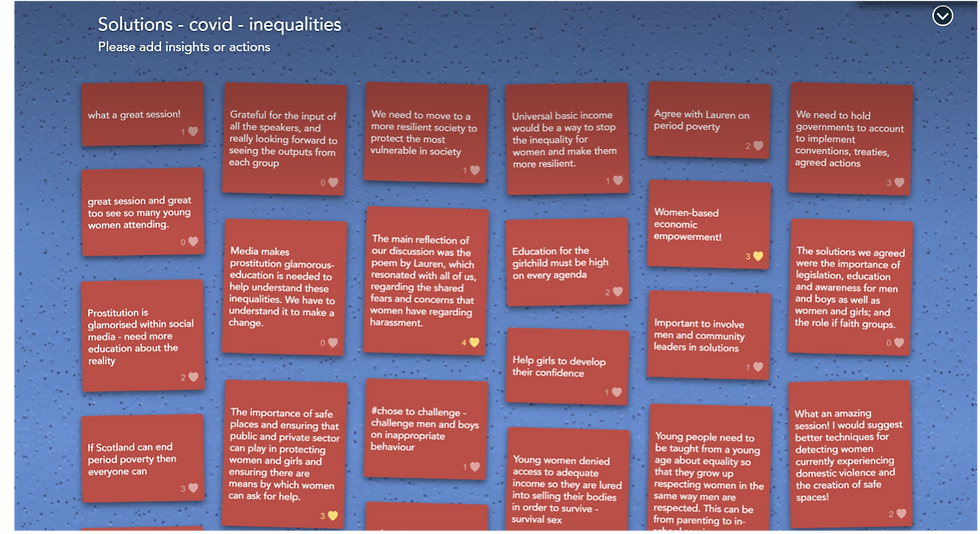All in the same boat: how this year’s CSW is changing our lives for decades to come (Part 2)
- UN House Scotland

- Apr 8, 2021
- 3 min read

My experience exceeded well beyond any expectations of this year’s digital session.
CSW65 stretched to reach and reconcile as young girls, as older women in a single debate. During the event with NAWO, I truly embraced this diversity of speakers and the issues they advocated.
The energy flowing from every contribution was highly relatable as if we all took part in confronting the negative externalities of the long-standing issue – the lack of a priority and domination of gender lenses on any public policy.
What I re-discovered was the proximity in experiences while discussing the speakers’ contributions and sharing what was it that each of us felt about the issue.
The first thought of when one could be assigned to the break-out room could well be “right, I can no longer hide behind the turned off camera - moreover, I also have to speak”.
But CSW is such an open and inclusive space that breakout rooms turned into a much-desired chance to truly understand: what was it that other attendees thought of this issue? How would they proceed to resolve it in their societies? What is it that we can take away and cement as the next difference we will make in our local communities?
It is without a doubt that this year’s CSW not only unites a shared and a well-founded worry for the current and long-term impact of covid-19; it is also a heightened interest to understand each other’s experiences and thoughts in figuring out the problems that touch upon all of us.
Maybe the pandemic has really brought us closer and reminded us, yet again, that the world cannot only focus on benefitting several countries.
The most efficient way is synchronising our efforts in providing shared solutions to shared problems.
In my breakout room, I quickly found myself with three civil society activists, a Member of Parliament and a high school student.
What really united us was the beautiful poem written by Lauren, a high school student, who put her feelings of anxiety and fear of anytime-happening sexual harassment.
This could not avoid reflecting on how we all felt while walking that dark street, be it late at night or in any other situation during the day.
No matter the age or position, we all pondered about the contemporary realities of protection of women and girls even in the most developed countries like the UK.
What if it was not Sarah Everard but me walking that day in London?
So many times, we found ourselves walking similar streets as herself, feeling anxiety over any potential threat and, what Lauren perfectly described, experiencing the hanging “paranoia” that continues to haunt us no matter the age.
There is little certainty of walking in the dark as much as confidence in proving the perpetrator guilty.
Our mosaic of backgrounds and policy ideas turned the discussion from common experiences to addressing the root causes of why we often felt unsafe.
To mention a few: the need for safe spaces, the lack of legislation, criminal responsibility and system detecting the victims of harassment and domestic violence.
Education particularly stood out as it can prevent the vicious cycle of harassment for the next generations to come.
It was clearly not enough for us to discuss all these issues and solutions in twenty minutes, but be rest assured – the feeling of inspiration, empowerment and collaboration is the fuel and the fire to carry for our post-CSW work and sustainment of gender equality in our local communities.

And so, as we close our laptops for the day - instead of chattering in one of the restaurants on the nearby Third Avenue - we have one thing clear: this is the consolidation of civil society never seen before.
This is the chance to finally make so many unheard voices count.
This is a momentum to demonstrate states that the civil society is highly committed to supporting them in implementing their public policies ensuring protection, access and better standards of living for millions of women and girls who cannot yet participate in the CSW or likewise consult the government.
One day, hopefully, they will, and this entirely depends on what we do today.
Not without a reason, one speaker called covid-19 a catalyser, not a galvaniser.
I hope that the observable urgency of solving these long-standing issues will rapidly translate into the growing number of gender equality achievements for the many CSWs to come.











Comments